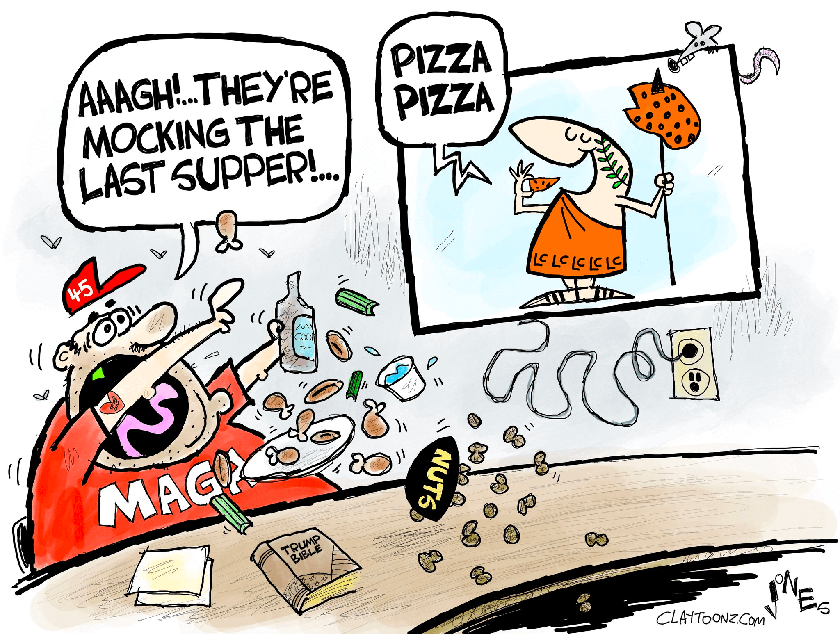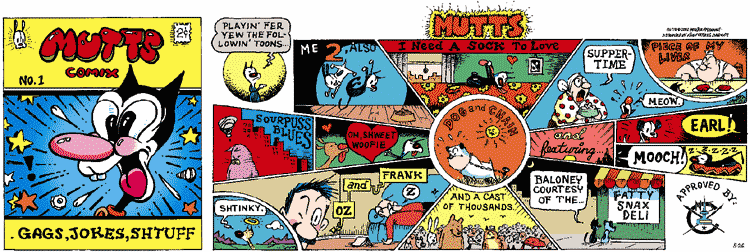CSotD: Satire, Parody and Homage
Skip to comments
Steve Brodner offers an affectionate portrait and tribute to his friend and mentor, Lewis Lapham, a legendary editor at Harper’s who died last week at 89, an age at which one is permitted to die but which gave him a good, long opportunity to influence the world, though, as Brodner’s words indicate, he still left people wishing for more.
It’s an enviable legacy.
I only had a brief brush with Lapham, but it mattered to a young writer: He wrote a kind, personal rejection letter for a parody I’d written of Jonathan Livingston Seagull, a best seller in the early 70s about a seagull who wished to fly better and higher than the other seagulls.
It was inspirational piffle, and my version was about Jonathan Livingston Beagle, whose dearest wish was too pee better and higher than the other dogs.
Lapham declared it “uplifting,” a delightful pun that softened the blow of his saying it didn’t maintain, and he was right. It was funny for awhile but went on too long.
Bored of the Rings notwithstanding, parody needs to explode and get out. Satire can stick around longer, and Brodner’s posting includes Lapham’s thoughts on that topic, which are particularly relevant today and are worth reading.

Clay Jones satirizes the off-the-wall outrage of Christian bluenoses to the Dionysian float at the opening of the Paris Olympics, suggesting that such people might find offense not only in depictions of Greek mythology but also in Roman pizza.

The issue is the assumption that any depiction of a number of people gathered around a dinner table and facing outward is necessarily the Last Supper. And perhaps, in hindsight, there should have been a plaque specifying Dionysius for those not familiar with his place in French history and culture.
As noted the other day, however, there’s nothing new in people misinterpreting satire, parody and homage; in 1729, outraged readers thought Jonathan Swift was seriously proposing eating the children of the poor. I think it much more reasonable to mistake the Dionysian feast for Leonardo’s depiction of the Last Supper.
Unlike Jones, I don’t think it’s one of the folkloric stories of the Bible, but, then again, I’ll bet they didn’t all sit on the same side of the table facing outward. Nor, for that matter, did people celebrating Dionysius.
But let’s define terms: Satire is use of critical, mocking exaggeration, while parody mocks through direct imitation, and an homage is a tribute that copies something in a tone of admiration.
The lines separating them are extremely fluid, but the float was an homage, not a satire or parody.

This Candorville (KFS) is satire. Darrin Bell is satirizing MAGAts in how they attack Kamala Harris and, as seen in the final panel, for the desperation with which they have had to shift strategies following Biden’s withdrawal and Harris’s promotion to lead candidate.
He uses genuine accusations, but demonstrates their foolishness by boiling them down to the absurdity of claiming all government employees are collecting welfare, and he also signals his intentions by making the MAGA cap oversized and by having Lemont listen with mounting impatience and contempt.
The compliment to the reader is in there being no fourth-panel retort. Bell employs the dig in the ribs of “We smart people, you and I, both understand how foolish these other people are.”
Like Swift, he doesn’t admit the satire. That would ruin the effect, just as, in Gulliver’s Travels, Swift has his hero and narrator describe Lilliputian political ambitions without suggesting that tightrope walking was a satire of anything in England:

This doesn’t mean satire can’t make obvious, hilarious jokes. Just as Jones makes an absurd joke about Little Caesar being mistaken for a religious figure, Voltaire made Candide a consistently hilarious and bawdy story, which satirized the philosophy of Leibniz but didn’t require having studied him.
You just had to doubt that “all is for the best in this best of all possible worlds” and be willing to laugh at anyone who thought so.

By contrast, while Wiley’s intent in this Non Sequitur (AMS) is satirical, he frames the comic as a parody of drug commercials, swapping out physical side effects for political side effects.
Note that, while Bell sat back and made the reader fill in the meaning, Wiley is more directive and offers an explanation in the final panel. It’s an option to avoid being misunderstood, and even Voltaire, in the final chapter of his novel, has Candide explain the meaning of the jest.

This Arlo & Janis (AMS) is neither satire nor parody but Jimmy Johnson offers a sort of homage, given that Arlo clearly admires Rubens and considers the comparison a compliment, the joke being that Janis is well aware that “Rubenesque” is a euphemism for “fat.” Their husband-and-wife discussion continues in their current arc.
The question, of course, is whether it is an homage to Rubens or to Janis, given that regular readers of the strip realize that the couple each kvetches over becoming middle-aged, but Arlo continues to be both uxorious and libidinous.
In fact, there are times he’s damn near dionysian. The strip isn’t satirical, but sometimes borders on the satyrical.
Lewis Lapham wrote in his introduction to Brodner’s book, “Satire is humor sent on a moral errand,” and, as has been argued in the discussion of the ongoing dirty jokes about JD Vance and couches, satire requires an intention.
Phyllis Diller satirized the way women were portrayed in beauty and fashion, but Don Rickles calling someone a hockey puck is just insult humor.
The distinction is becoming increasingly important, given that, as Casey Newton argues on Platformer,

It’s definitely coming from both sides: While the left giggles over couch jokes, Elon Musk prohibited fake videos on Twitter and then posted a fake video that attacks Kamala Harris, whom he hopes to see defeated in November, later declaring it satire, having first posted it simply as “amazing.”
People may have thought Swift was serious in his suggestion to eat children, but at least they weren’t voting on the proposal.
Finally, for an example of an homage, we turn to Mutts (KFS), which has a tradition of homages to album covers:




Comments 10
Comments are closed.